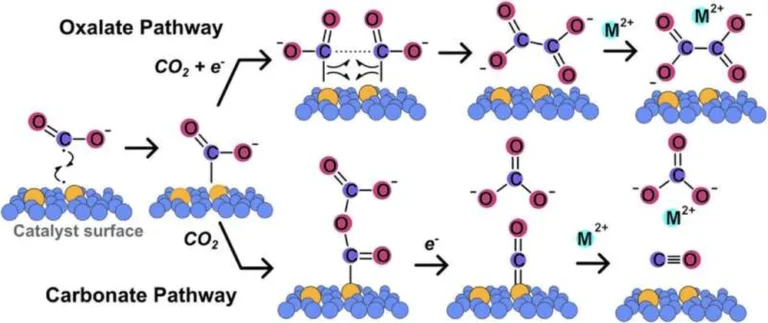
University of Michigan Researchers Convert Captured CO₂ into Cement Materials
Researchers at the University of Michigan developed a method to capture carbon dioxide and convert it into metal oxalates, which are used in cement production. They published their findings in Advanced Energy Materials.
The proposed carbon capture method. Image from University of Michigan.
>> In Other News: Blue Spirit Targets First Flight For Hydrogen Four-Seater Early 2026

The proposed carbon capture method. Image from University of Michigan.
Methodology: Lead catalyst
Previous research has shown that lead can be used as a catalyst to convert carbon dioxide into metal oxalates. However, this method typically requires large amounts of lead, an environmental and human health hazard.
Charles McCrory, associate professor of chemistry and macromolecular science and engineering, and his team at the Center for Closing the Carbon Cycle (4C) found that using polymers to control the microenvironment around the lead catalysts reduced the amount of lead needed to convert carbon dioxide.
The team used a set of electrodes to produce oxalate from carbon dioxide. At one electrode, carbon dioxide is converted to oxalate. The other electrode is a metal that is being oxidized and releasing metal ions, which bind with the oxalate ions and create a metal oxalate solid precipitate.
Once the carbon dioxide is converted into the metal oxalate solid, it won’t be released as carbon dioxide under normal conditions, said McCrory.
Why traditional cement production has a high environmental cost
According to the EPA, 92 cement plants reported emissions of 67 million metric tons of carbon dioxide equivalents in 2019, 10% of the industrial sector’s direct reported emissions.
The most common type of cement is Portland cement. The main ingredients are calcium, silicon, aluminum, and iron. According to McCrory, producing this kind of cement has a high energy cost and a large carbon footprint. This is why he and his colleagues began looking into ways to mine carbon dioxide and convert it into materials that can be used to make cement.
Charles McCrory and the team
"This research shows how we can take carbon dioxide, which everyone knows is a waste product that is of little-to-zero value, and upcycle it into something that’s valuable," said McCrory.
"It’s a true capture process because you’re making a solid from it," he said. "But it’s also a useful capture process because you’re making a useful and valuable material that has downstream applications."
"Metal oxalates represent an underexplored frontier—serving as alternative cementitious materials, synthesis precursors and even carbon dioxide storage solutions," said Jesús Velázquez, a co-lead author of the study and associate professor of chemistry at UCD.
"In this work, we have an example of a trace lead impurity actually being a catalyst. I believe there are many more such examples in practice catalysis, and also that this is an underexplored opportunity for catalyst discovery," said Anastassia Alexandrova, a co-lead author of the study and professor of chemistry and materials science at UCLA.
McCrory says the next steps will be to further study how to scale up the process, particularly the formation of the metal oxalate solid.
About University of Michigan
The University of Michigan is a top-ranked public research university in Ann Arbor, Michigan, known for excellence in education, research, and public service across a wide range of disciplines.
Subscribe to the newsletter
Daily decarbonization data and news delivered to your inbox
Follow the money flow of climate, technology, and energy investments to uncover new opportunities and jobs.
Latest issues
-
What Do Submarines Have to Do With Hydrogen?
Inside This Issue 🚢 Hyundai Pitches Hydrogen Transport Tied To Canada Submarine Bid 🧱 The LEGO Group Expands Its Portfolio Of Carbon Removal Solutions 🏆 SAF Pioneer LanzaJet Honored With RFA Indus...
-
This $4.1M Deal Could Change Carbon Capture's Playbook
Inside This Issue 🗜️ CarbonQuest Lands $4.1M Alberta Deal on Gas Compressors 🛡️ CADO, 123Carbon, and Assure SAF Registry Join Forces to Tackle SAF Integrity Gaps ✈️ ISCC, OMV, and Airbus Partner t...
-
Can Koloma Crack Iowa's Billion-Year-Old Secret?
Inside This Issue ⛏️ Iowa's Hydrogen Rush: Can Koloma Strike Gold Before Rules Kick In? ✈️ Bentley Commits to Use 100% Sustainable Aviation Fuel for Car Airfreight 🌬️ Minister Parrott Provides Upd...
Company Announcements
-
CHIFENG, China, Feb. 27, 2026 /PRNewswire/ -- Envision Energy launched the first global shipment of green ammonia from Chifeng, Inner Mongolia to LOTTE Fine Chemical, a premier chemical company in ...
-
SAF Pioneer LanzaJet Honored With RFA Industry Award
Pioneering sustainable aviation fuel producer LanzaJet received the Renewable Fuels Association’s 2026 Industry Award at the National Ethanol Conference in Orlando this week. Last year the company ...
-
Houston Hosts World Hydrogen North America 2026 Industry Gathering
Hydrogen is one of the energy sources that has evolved the most when it comes to how developers plan and execute projects. The main reason for this is the advanced technology that has penetrated th...
-
Trump EPA Eyes Reallocating Waived Biofuel Obligations To Refiners: Report
The question of whether to reallocate those exempted blending obligations to larger refiners is a point of contention between the agriculture and fuel industries The Trump administration has settl...